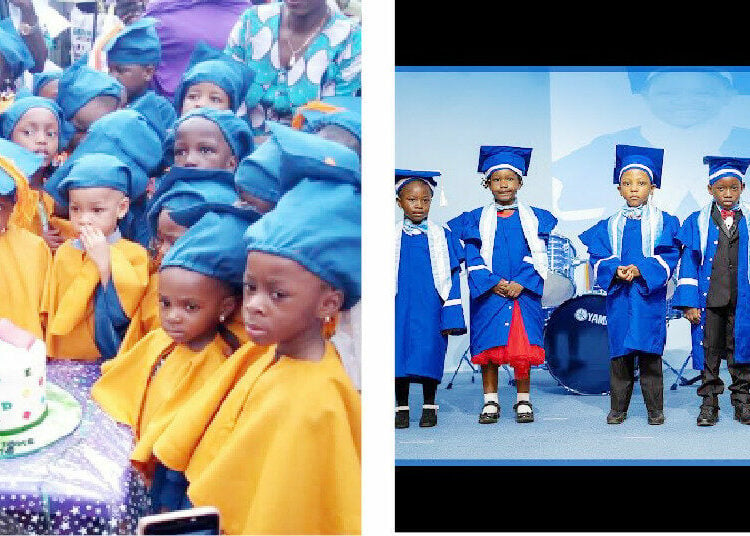On a hot Friday morning in August, Chinyere Nwankwo stands outside the gates of her daughter’s private school in Imo State, clutching a plastic chair, two Ankara outfits, and a graduation invitation card printed in pink. Her 5-year-old daughter, Ifunanya, is “graduating” from kindergarten. “Graduating from where to where? KG3 to Primary 1? All these expenses, for what?” Chinyere scoffs.
The ceremony has cost her over ₦58,000: ₦18,000 for the graduation gown (rented, not owned), ₦20,000 for a customised Ankara outfit, ₦10,000 for “graduation logistics,” and the rest for snacks, chairs, class contributions, and a photographer she never asked for. Like many parents, she has had enough.
John Okechukwu, father to five-year-old Chimamanda, who just completed her kindergarten class at one of the private schools along World Bank Road in Owerri, the Imo State capital, shares a similar experience. While he loves the way Chimamanda recites nursery rhymes and other things, like the 36 states and their capitals, he didn’t bargain for the shock he got from the school management.
Last June, upon returning from work, Chimamanda handed him a circular from school about her graduation party, with a fee of ₦60,000. Her school fees for the last term were ₦70,000. Mr. Okechukwu simply told his daughter to forget about the party, but that drew the wrath of his wife, Nkechi, who insisted he must pay it and also provide some money to host her friends so that it doesn’t seem like it’s only their family that is affected by dwindling resources. All entreaties to her fell on deaf ears, and after much complaint from Chimamanda that she was the only one who hadn’t paid, he parted with the money. As far as he is concerned, that graduation party was useless and an extortion.
The party was held during the last week of July, and daily, his wife has taken to his social media handles to flood the pictures of the event. His concern now is how to raise the school fees for Amanda’s Primary One class, textbooks, uniforms, while he still has to save for the renewal of their annual ₦1,000,000 three-bedroom rent.
Across Nigeria, particularly in urban centers, private schools are turning what should be a modest classroom send-off into full-blown red-carpet ceremonies, squeezing parents who are already reeling under the weight of economic hardship, rent hikes, and skyrocketing food and transport costs.
An Economy in Crisis, A Ceremony Out of Control
The cost of living in Nigeria has skyrocketed. With inflation hovering near 30 percent and the price of transportation and fuel doubling in the last year, many families are prioritizing food over flamboyance. Yet, school administrators in many private institutions seem to be living in another reality.
In most of these private schools, graduation isn’t complete without a so-called “certificate of advancement” and a strictly enforced dress code. Schools often mandate that children appear in specific, sometimes uncommon colors like lemon green, wine, or turquoise blue, leaving parents scrambling through overcrowded markets in search of exact shades and tiny sizes that are rarely available.
The stress is compounded when sellers take advantage of the rush, hiking prices, while parents, especially those with toddlers, struggle to find properly fitting outfits. In many cases, schools reject close alternatives, insisting on their chosen palette and leaving already financially strained families with no option but to keep searching or pay a fine.
Mr. Uchenna Eze, an educationist based in Umahia, in Mbieri, had this to say: “Parents are being emotionally blackmailed. The schools will say, ‘If your child doesn’t participate in the graduation, they will feel left out. They won’t take part in class pictures or the party.’ That’s coercion, not education.”
The most disturbing part, he says, is that there is no educational value in these ceremonies. “What learning outcome is attached to a 4-year-old dancing in glitter and holding a certificate they cannot even read? We are turning childhood into performance and parents into ATMs.”
A Governor Draws the Line
Only recently, Imo State Governor, Senator Hope Uzodimma, made headlines when his administration banned graduation ceremonies for pre-nursery and kindergarten pupils in the state. He said, “Let children be children. Schools should not place undue financial pressure on parents over ceremonies that are unnecessary and add no academic value.”
While the ban was hailed by many as a bold move, some private schools have quietly ignored it, insisting on “end-of-year” events that are indistinguishable from graduation parties, only now they use new names like “Class Advancement Ceremony.” “The ban is symbolic, but without enforcement, it’s business as usual,” some people have argued, especially since the government is not known to carefully ensure compliance with policies.
A retired headmistress and education consultant in Ikeduru, Mrs. Bolanle Nwaeze, said, “The ban is symbolic, but without enforcement, it’s business as usual. What’s worse is that this culture is spreading even into small towns.”
We Cannot Reuse Old Books – Another Form of Extortion
Beyond the ceremonies, another sore point for many Nigerian parents is the issue of non-transferable textbooks. Unlike in public schools where older siblings can pass down books, most private schools insist on freshly purchased copies every year, often from the school itself.
A father of three in Abuja, Mr. Ahmed Lawal, complained, “I have three kids. The same school, same curriculum. But I’m told every year that new editions of books have been ‘updated’ and old ones are no longer acceptable. It’s a racket. The same book with just a new cover design – ₦12,000 gone. And sadly, we are talking about the right textbooks.”
In some cases, schools go as far as requiring parents to buy customized notebooks with the school’s logo at prices twice the market rate.
Our Children Are Not Props – Parents Push Back
LEADERSHIP Sunday findings revealed that more and more Nigerian parents are beginning to voice their discontent. WhatsApp groups are filled with rants, voice notes, and even coordinated boycotts of unnecessary school spending.
Fielding questions from our correspondent, Mrs. Josephine Obi, a mother of two in Owerri, had this to say: “I told them I wouldn’t pay for any ceremony. My daughter went to school in her regular uniform that day, even after they ensured she didn’t participate in any presentation. When the teacher told her to stay in class during the event, my child cried. That’s how they punish the children to shame the parents.”
She adds bitterly: “Private education has become a business cartel. And our children are the bait.”
What Should Be Done?
Experts and parents alike are calling for a regulatory framework that limits exploitative practices in private schools. They suggest strict enforcement of state bans on kindergarten graduations, as already done by the Imo State government.
They advocate for a price cap on non-academic school activities to prevent financial exploitation of parents. They also call for clear guidelines on book reuse and acceptable editions to stop schools from forcing unnecessary new purchases.
This is even as they urge the deployment of independent school inspectors to monitor and enforce ethical practices in private education. Some also believe the federal government should take up the matter at the National Council on Education, creating a uniform policy on what kind of graduation is appropriate and at what age.
“This isn’t about killing joy or culture,” says Mrs. Adeyemo Adeyemi, who spoke to our correspondent on the phone from Lagos State. “We are simply saying: let learning be the focus, not parties, uniforms, and profiteering.”
LEADERSHIP Sunday reports that most of the parents who spoke on condition of anonymity for fear of their wards being victimized said, “Annoyingly, these elaborate kindergarten graduation ceremonies often come less than two weeks after other school events like Career Day and Cultural Day, each carrying its own financial demands.”
They told our correspondent that “On Cultural Day, parents are expected to dress their children in traditional attire and prepare native dishes, sometimes enough to serve the entire class.
While on Career Day, parents are required to rent or sew professional costumes, doctors’ coats, lawyers’ wigs, pilot uniforms – all for a one-day event.”
By the time the graduation bill arrives, many parents are emotionally and financially drained. “It’s like a back-to-back ambush,” says frustrated Mrs. Helen Uzohuo, a mother of two. “We don’t even get a breathing space.”
For many households, especially those surviving on tight monthly incomes, the school term becomes a period of anxiety, panic, and sleepless nights. As one parent bluntly put it: “We don’t fear school fees anymore; it’s the ‘other’ expenses giving us high blood pressure.”
Childhood or Capitalism?
As Nigerian families continue to tighten their belts, the question becomes urgent: Should education be another avenue for exploitation? For Chinyere and millions of other struggling parents, the answer is clear. “I just want my daughter to learn, to play, to grow. I didn’t sign up for red carpet madness and financial harassment. Enough is enough.”
Former Imo State Chairperson for the National Association of Women Journalists, Barr. Vivian Ottih, commended the ban by the state government but wished it had come earlier and saved parents from the last session’s extortion. Ottih said, “It’s a welcome development, but unfortunately, we have already been exploited last term and forced to pay those huge sums for irrelevant kindergarten graduation parties.”
However, I want the government to look at the problem and resolve it entirely. “The mass exodus of pupils and students into private schools is due to the level of education in our government-owned schools, where there is almost a total collapse. Look at Akwakuma Girls Secondary School, which used to be a pride and boast in those days but now lies dilapidated and begging for attention.”
“Private school owners are only trying to cover the lacuna of public schools where the system has collapsed. The government should help us get quality education at an affordable price. Once our public schools are fixed, parents will return to those schools, and private school owners will stop their extortion to keep the remaining children. After all, we all went to public schools in our schooling years,” Ottih said.
Another parent, Fred Chukwuemeka, said the government must encourage parents to notify them if private school owners start those silly extortion styles, especially on the textbook stance. “The Education ministry must have an avenue where parents can report developments in their children’s schools so that it doesn’t amount to an audio policy. And it must be sustainable so that no matter who the Commissioner is, schools are upgraded and standards maintained,” Chukwuemeka said.
Nkechi Ndukwu, a single mother, said parents grapple with so much to fend for their families and must not be pressured into debts and avoidable health issues. She said, “The day my son returned from school with the circular for ₦58,000 graduation fee last term, I totally lost it. I didn’t pay it and simply decided that I will change his school for primary education next term. It just dawned on me that I didn’t have to enrich somebody’s stupidity by compliance, and that’s what I did.”
However, she noted that her son was bitter about not attending the party, despite being an A pupil. Others like Dominic Okpor said the new textbook policy will save parents from running helter-skelter for resumption. Joel Okere said it will reduce the amount of abandoned textbooks in his house, as there was no need to buy new ones since his son can use his elder brother’s books due to the two-year age gap.
The Commissioner for Education in Imo State, Prof. Bernard Ikegwuoha, said the four-year textbook use policy is designed to reduce the burden on parents, which some analysts believe will help reduce health issues like high blood pressure.
Ikegwuoha said, “Proprietors are warned to desist from frequent changes of textbooks every academic year, as this practice can be financially burdensome for parents and undermine the quality of education. By adopting the approved textbooks and allowing them to be used for the specific period, schools can promote a more efficient and effective learning environment.”
According to him, the policy aims “to promote stability and consistency in education; proprietors of faith-based and private schools are required to adhere to the approved lists of textbooks. These textbooks are designed to be used for a period of four years, allowing children (pupils and students) to use the textbooks of their siblings for four consecutive years.”
As the date for resumption draws close, parents are basking in the euphoria that they can heave a sigh of relief, as they can borrow books from other parents at cheaper prices.





